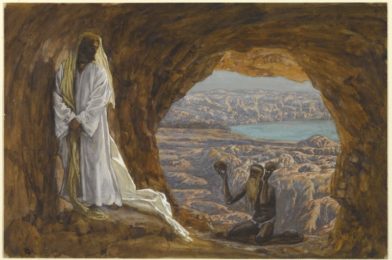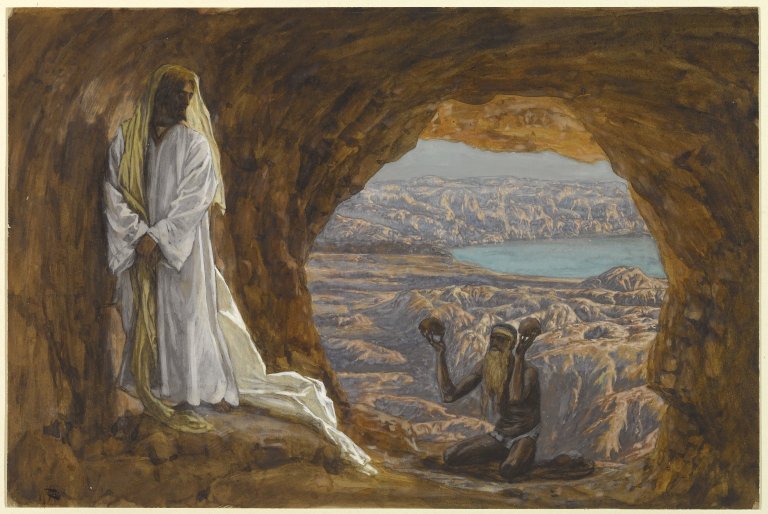Instant oatmeal. Instant mashed potatoes. Instant rice. Instant pots. Instant gratification. Our world lives in the here and now and we demand what we want when we want it here and now. We don’t have time to wait. Waiting is laughable. When we can have anything we want whenever we want it, waiting is a joke, isn’t it? When millions of dollars are won and lost in milliseconds, waiting is a risk, isn’t it? When seconds count in CPR, waiting is deadly, isn’t it? Waiting is anti-capitalism…waiting is un-American…waiting is so difficult that we would rather forgo the end just to get what we can have right now.

Like most of us, I’m not big on waiting. As a child knowing a big event was coming up – church camp, Christmas, my birthday – I would be sleepless for nights prior; my excitement kept me awake and I could hardly wait. In the weeks leading up to my marriage proposal it took everything within me to stay on schedule and follow through with the planned day – I didn’t want to wait any longer to be engaged and married. As my partner works the remainder of her residency we work towards the next chapter of our life together, waiting for God to guide us to where and what we would do next. Waiting in good times is hard, but waiting in difficulties gnaws at my spirit and I often wonder how much more I can take; more often than not I end up yelling at God for delaying, for taking so long, for making me wait: “Hear, O Lord, when I cry aloud, be gracious to me and answer me!” (Psalm 27:7)
Through the daily news I hear stories from Ukraine, stories of citizens – old and young – fleeing and fighting, fearful and faithful, all stretched to their limits as they live through the unprovoked, illegal Russian invasion, occupation, and war. I can’t imagine what decisions the Ukrainians have had to make – and continue to make – on an individual level for mere survival. How long they have waited! How long would I be able to wait, stretched to the limits until I couldn’t possibly wait anymore?
Since Europeans first set foot in the Americas, men and women who didn’t look like them were enslaved and traded, abused, murdered and tossed aside like garbage. For nearly five hundred years human beings on both sides of the Atlantic have treated other human beings as ‘less than’ – a mindset and practice which still occurs to this day. Racist and supremacist attitudes and behaviors are entrenched in our cultures, institutions, and personal beliefs, forcing people of color to continue to wait for equity and equality, to wait for desegregation and integration, to wait for acceptance and love. How long they have waited! How long would I be able to wait, stretched to the limits until I couldn’t possibly wait anymore?
This week marks two years since Missouri’s first confirmed case of COVID-19 and the residents here in the southwest corner of the state, like so many across this nation, have been less than patient with their neighbors, with the virus, masks, and vaccines. The virus and the work to defeat it has caused disruptions in every corner of life: each of us has been touched by the shift in the workforce and extended unemployment…by the dip in income and rise in inflation…each of us dealing with the physical, emotional, and spiritual effects of being isolated and alone for so long. How long we have waited for a reprieve! How long will we be able to wait, stretched to the limits until we can’t possibly wait anymore?
Here in the second week of Lent, as many of us pray, fast, and seek justice for our neighbors we have to admit that we’re already over it. We’re tired of waiting for Easter…we’re tired of waiting for ordinary time – for ordinary life – both in the church and in the world. We’ve been patiently waiting and diligently working but dang it, we’re over it. The Psalmist’s words this week ring in our Lenten hearts: “Do not hide your face from me. Do not turn your servant away in anger, you who have been my help. Do not cast me off, do not forsake me, O God of my salvation!” (Ps. 27:9) My translation: “Enough already, God!”
Like the psalmist, we too stand before God demanding satisfaction and gratification right now. No more waiting! How long, O Lord, will we be able to wait, stretched to the limits until we can’t possibly wait anymore? How much longer must we face war and violence, invading forces and enemies which seek to kill us? How much longer must we be seen as less than…be chased down and beaten down, murdered in our streets and homes because we don’t have the skin color of the ones in power? How much longer must we live under old relationships in the shadows of emotions from our abusers? How much longer must we be alone, left and abandoned, burdened with the realities of life? How much longer…
…..
I wish I had an answer to this. I wish I had a time frame that I could tell you about to alleviate the anxiety…but I don’t. I wish I had an answer to how much longer because I, too, am waiting. So I read on through this psalm to it’s final two verses. The Psalmist concludes their prayer with these words: “I believe that I shall see the goodness of the Lord in the land of the living. Wait for the Lord; be strong, and let your heart take courage; wait for the Lord!” (Ps. 27:13-14)
Wait.
The one thing we don’t want to do any longer is the one thing we’re most encouraged to do: wait. The answer our question of how much longer is but a command: wait. The Hebrew word used here for wait is קַוֵּ֗ה (qavah) which principally means to wait or look eagerly for and we get that, we live and push against that all day, everyday. But look at this definition from Ernest Klein, who says “the original meaning probably was ‘to twist, stretch’, whence ‘to be stretched, be strained’, whence ‘to await tensely.’”
The psalmist reminds us that the things of this world will assuredly cause us to be stretched to our limits, pulled to the point of breaking…we will be waiting in tension for God to answer us, to respond to our prayers, our complaints, our demands. We will be waiting in tensions of war and violence. We will be stretched thin as we wait to be recognized and valued. We will be waiting, strained, as our emotions remember…as our spirits remain alone.
And the psalmist reminds us that on either side of us, tensions await: “Wait for the Lord…wait for the Lord!” You’re going to be stretched…you’re going to be strained! But notice what the psalmist places in the midst of that tension and strain, of that stretching us thin: “be strong, and let your heart take courage.” The psalmist encourages us to be bold and alert, for our hearts to be firm, resolute, and courageous in the midst of the strain and stretching.
It’s hard. Most everything we experience and go through in this world is hard…it’s difficult…it challenges us and pulls us from all sides. This world is prone to stretching us to our breaking point. This world is apt to strain us to exhaustion. I know it because I’ve lived it…because I’m living it right now. But I believe.
I believe that we shall all see the goodness of the Lord in the land of the living.
I believe that God will hide us in his shelter in the day of trouble;
that God will hide us under the cover of his tent;
that God will set us high on a rock.
I believe and I wait, I wait and I believe.
The Lord is my light and my salvation – whom shall I fear? The Lord is the stronghold of my life, of whom shall I be afraid? I believe! I believe! I believe! I wait and I believe and I give thanks to God. Amen.
much love. sheth.





